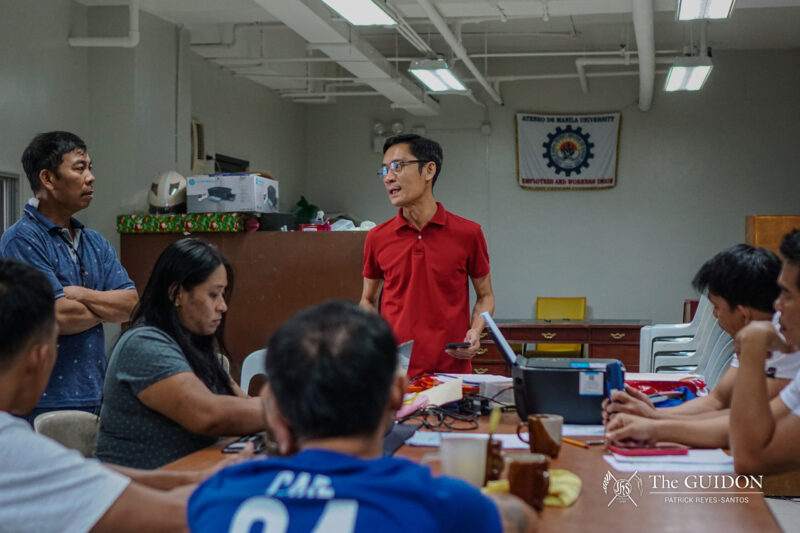AN INITIATIVE to incorporate service-learning in the degree offerings of the different Ateneo universities emerged during the 28th Buklod Atenista Congress, which was held last May 26 to 29 at the Ateneo de Davao University. Service-learning is an educational principle that integrates a social dimension to academic work.
The annual congress brought together the five Ateneo universities, the Ateneo de Manila, Ateneo de Davao, Ateneo de Naga, Ateneo de Zamboanga, and Xavier University – Ateneo de Cagayan.
22 resolutions were discussed and passed during the three-day summit.
Nat’l issues, campus resolutions
The congress started off with discussions on national issues, such as the peace process in Mindanao and an evaluation of the Aquino administration.
On the third day of the congress, the student leaders reviewed the 18 resolutions passed during the 27th Congress of Buklod Atenista, which was held the previous school year. Eleven of the 18 resolutions were fulfilled, two were repealed for irrelevance, and five are still ongoing implementation.
During that time, too, 22 new resolutions were approved for the coming school year—the main concern being service-learning.
Sanggunian Vice President and former Buklod Atenista Secretary-General Gio Alejo explained that service-learning became the congress’ focus because of an issue that former Sanggunian President Rob Roque raised during last year’s congress.
Roque wanted to address the challenge of the Society of Jesus Superior General Fr. Adolfo Nicolas, SJ regarding the current situation of Jesuit education and the students’ depth of thought.
“We were able to connect it with the service-learning program because it’s a good way for us to apply what we are learning in school. It’s training for us to see where we can best apply our learning,” Alejo said. “[It] is one of the key aspects that will help in terms of forming the Atenean to really be a man or woman for others.”
Alejo explained that service-learning is the integration of what one learns in school with its application outside the university.
Socially involved
The congress was not just a meeting to pass resolutions. Pressing national concerns were also part of the discussions, such as the peace process in Mindanao, President Noynoy Aquino’s administration, and environmental degradation issues.
“[This shows] that all the Ateneo universities strive hard to get involved not only within the walls of their respective universities,” said new Buklod Atenista Secretary-General Cate Sison.
Specific concerns of each university were also aired during the congress. In Naga, for example, the student council is pushing for representation in the discussion of the tuition fee increases. Xavier University is considering the strict implementation of the ID rule for increased security. The Zamboanga and Davao Ateneos, meanwhile, wanted information campaigns to address the spread of sexually-transmitted diseases in their communities.
Phase-by-phase process
The implementation of the service-learning program will be divided into several phases. Phase one involves creating a body in charge of the service-learning initiative at each school. In the Ateneo de Manila, Sanggunian President Drew Copuyoc will head the body.
The next step involves research on the different courses that already offer service-learning. Students will also be consulted first on their perception of what service-learning is and whether or not they agree on its implementation in their specific programs.
An example of a course that already incorporates service-learning in the curriculum is health sciences. Students majoring in the course are assigned to Barangay Bagong Silang in Caloocan to help out in the community.
The third step involves identifying key people or offices that could support the program. Alejo said that there might be opposition to the full implementation of the program. This step is to determine the extent of the support that each school is willing to provide.
By October, each university will present their reports identifying the courses and faculty willing to support the initiative and the general sentiment of the students. Alejo said this was because not all schools may be ready to implement the program.
After this stage, and if the feedback is positive, the student council will lobby for the program to the faculty and administration.
“It won’t be forced [because] there might be some schools [that] are really not ready yet [for] the full implementation of the service-learning program,” Alejo said, adding that the initiative was a “paradigm shift.”
Friendship and camaraderie
The different Ateneo universities came together in an atmosphere of friendship and community-building, Secretary-General Sison said.
“The atmosphere was not that of competing Ateneo schools striving to be better than the other,” she said. “The atmosphere was more of… wanting to help and to be helped as well.”
She added that the different student councils would suggest action points and recommendations whenever a particular student council presents its particular problems and challenges.






